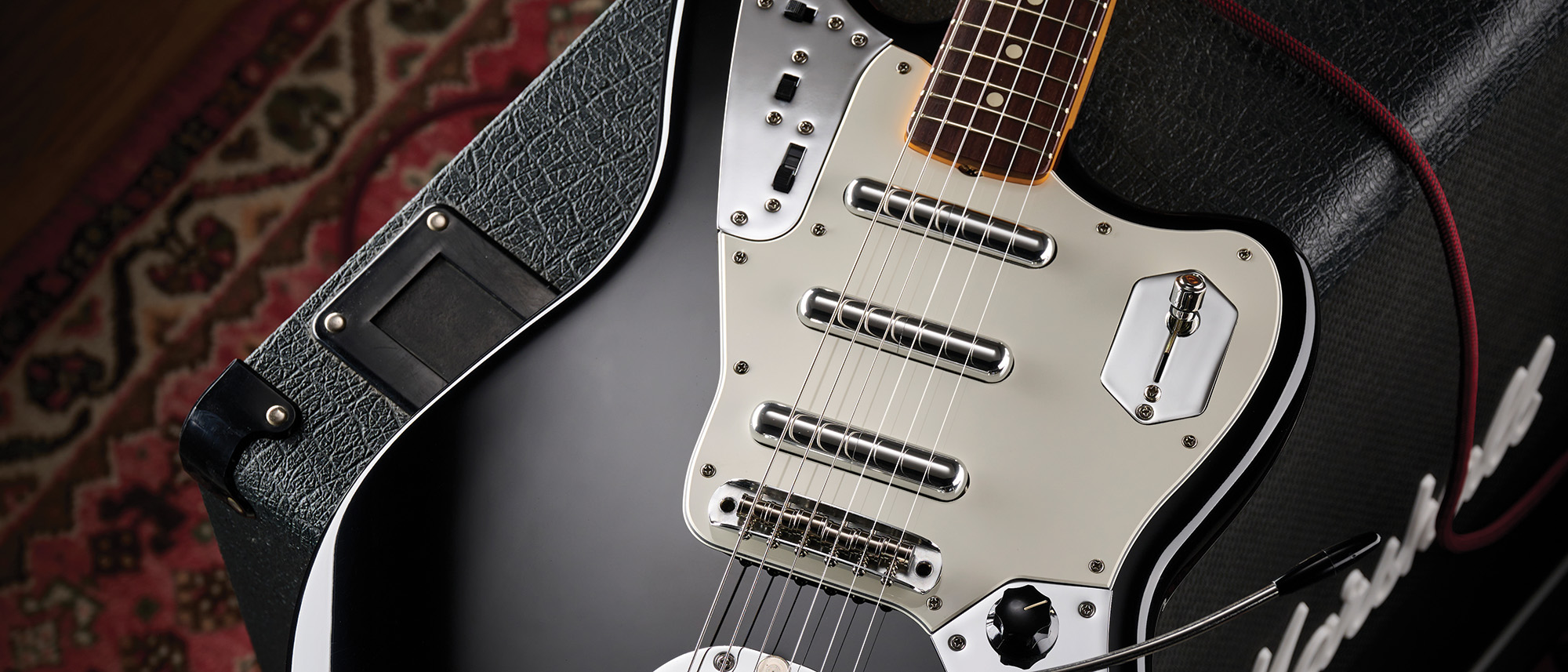Guthrie Govan: "Make sure you explore the whole range of your guitar – not only will you become a better player, but also a more informed buyer"
Bought & Sold: The Aristocrats guitarist on his greatest gear hits and misses, including the most original reason we’ve heard for buying a 335 and an affection for ring modulators

All the latest guitar news, interviews, lessons, reviews, deals and more, direct to your inbox!
You are now subscribed
Your newsletter sign-up was successful
What was the first serious guitar that you bought with your own money?
“I’m going to have to say an Ibanez JEM, I think. I had the precursor to that in the form of an Ibanez RG550, which was none more black, but I don’t know if that quite qualifies as my first serious guitar because I bought it wishing it were a JEM. So when I actually got a JEM, that felt like a momentous occasion… for about a year and then I thought, ‘I’m going to have to sell this because it looks like somebody else’s guitar.’ I sold that guitar not long after acquiring it in the hope of shedding any unnecessary Steve Vai connotation and ended up buying a more grown-up looking Paul Reed Smith.”
What was the last guitar you bought and why?
“The last guitar I bought was a Nik Huber Orca 59. On the last Aristocrats studio album there’s a song called The Ballad Of Bonnie And Clyde and from the moment I heard the demo I knew instantly that the way I need to approach this song is to put on my '70s rock god hat. I need to be a guy with a Les Paul and I want it to sound like the Les Paul is around my knees and it’s going into a Marshall that’s far too loud. I had this character in my mind and so if I could somehow channel that character it seemed to me that I would be able to play the song in the spirit in which it was written.
The best way to prepare for buying a guitar is to take the guitar you already have and make sure you have explored every sound you can get out of it
“For the album [You Know What…?, 2019] I borrowed a Les Paul that was in the studio and which turned out to be the property of Kenny Loggins, of all people. Then we went on tour and everywhere we stopped I would go to a guitar shop, looking for Les Pauls, and finally we came to a place called The Guitar Sanctuary, which is an aptly named emporium indeed, in McKinney, a city near Dallas in Texas.
“Every time The Aristocrats go to McKinney at least one of us buys a guitar there. I asked them, ‘What have you got that’s kind of a Les Paul?’ I tried everything in the shop and this Huber just jumped out at me. There were lots of things that sounded like a Les Paul, but this thing sounded specifically like the Les Paul in my head. It had that Gary Moore, Peter Green thing. It practically sold itself.”
What’s the most incredible find or bargain you’ve had while buying gear?
All the latest guitar news, interviews, lessons, reviews, deals and more, direct to your inbox!
“I once bought a guitar because it had the same birthday as me. How’s that? I have a Gibson ES-335, very red, very secondhand, but whoever had it before me obviously took care of it as well. It’s the right kind of worn – use, not abuse. I remember finding it in a shop and googling the serial number and discovering it was made in either very late 1971 or very early 1972. I thought, ‘Cool, we could have gone to school together! This is meant to be…’ It is a nice 335, but at least 50 per cent of my motivation for buying it was that it’s the same age as me. I take that as some kind of significant portent.”
I once bought a guitar because it had the same birthday as me. I thought, ‘Cool, we could have gone to school together! This is meant to be…’ It is a nice 335
What’s the strongest case of buyer’s remorse that you’ve ever had after buying gear?
“I guess the closest I could come to that would be the following. Taking a year off between school and going to university, I spent it working in Essex Police Headquarters and saving every penny. My goal was to treat myself to a little home recording setup so I’ll collect what should be a year’s beer money and see what I can do at the end of it.
“I remember ordering a Fostex R8 and a Studiomaster mixing desk, a Yamaha power amp and two Tannoy monitors. All this stuff came in the post and I remember setting it up and trying to get it to work, trying to understand how a mixer operated, what buses were, and discovering things were muted when they shouldn’t have been. I really had no idea what I was doing. It took me quite a long time before I was able to record a signal onto a reel-to-reel machine. All the way through that process I was feeling these dark moments of thinking, ‘Have I just wasted a year’s worth of money on something that I’m not qualified to use?’”
Have you ever sold a guitar that you now intensely regret letting go?
“Not really. I used to be more soppy and sentimental about every single guitar I bought and possibly the thing that changed is going on tour a lot. I guess the realities of touring, particularly with bigger bands where your gear spends 22 hours a day in somebody else’s custody, maybe that’s partly what brainwashed me into this new mindset of letting go a little bit more and treating guitars more like a tool rather than something with real emotional weight.”
What’s your best tip for buying guitars?
“The best way to prepare for buying a guitar is to take the guitar you already have and make sure you have explored every sound you can get out of it. By messing with the knobs, by seeing how it behaves with different amp settings, how it reacts when you hold the pick differently; how many things can you do electronically or with your playing technique?
“Make sure you’ve explored the whole range of your guitar and not only will you have become a better player having gone through that process, but also you’ve become a more informed buyer. Hopefully the thing that inspired you to go to the music shop was this sound you hear in your head and you’ve tried every permutation of playing techniques and different control settings and the guitar you have doesn’t do that sound. That’s why you’re going shopping.”
When was the last time you stopped to stare in a guitar shop window (or browse online) and what were you looking at?
“The online gazing I’ve been doing recently has been more looking for something that has the topology of the fretboard but acts as a MIDI controller. I would like to find the perfect fretboard-shaped MIDI interface, rather than lusting after an old Strat or something like that. I’m in that fortunate place where I’m pretty happy with the guitars I have. If someone told me that for the next five years you can’t buy any more guitars, I could be at peace with that.”
If forced to make a choice would you rather buy a really good guitar and a cheap amp or a cheap guitar and a top-notch amp?
“I would go for the expensive guitar because I think the amount of bonding you do over time with a guitar is somehow deeper than the bonding you do with an amp. It’s a more tactile thing, it affects your playing technique, it affects the kind of things you want to play… I can imagine having a nice guitar and a bad amp and thinking, ‘Well, I can upgrade the amp one day,’ but playing a dog through a Dumble would not be that satisfying because the Dumble would just magnify the dogness.”
If you could only use humbuckers or single coils for the rest of your career, which would you choose and why?
“I’d go humbuckers, I think. As I came out of my dark metal phase of playing I realised you can actually get a decent clean tone with a humbucker as long as it’s not monstrously overwound and isn’t putting out 40 volts. A lower output, more sensitive humbucker can be decent clean – maybe more convincingly than the bridge pickup of a Strat will ever be able to do that thick overdriven thing that I need for my job. Oh, and I’ve just remembered that you can tap humbuckers and split the coils!”
Guthrie's go-to rig
“The last stage rig I used was two of my signature Charvel guitars: an ash-bodied one tuned down to D and a basswood one with a maple top not tuned down to D. That would run through a Fractal FX8, and then I do the four-cable method thing with that.
“The amp of choice would be a Victory V30 MkII. The core of my live rig with The Aristocrats is there’s a volume pedal in there all the time just before the input of the amp – and it doubles as a bit of a noise gate and it also enables me to approximate messing about with the volume knob on the guitar but without my picking hand ever leaving the string. There’s a wah always in the chain and the expression pedal is set so that as soon as you start moving it the wah engages.
I was an early adopter of ring modulators; as soon as I discovered that the ring modulator was a thing I had to buy one and I treated myself to the Moogerfooger
“Other than that, a little bit of reverb and delay, a little bit of chorus sometimes, and the closest thing to an interesting effect I was using on the last tour would be the Fractal Ring Modulator. I was an early adopter of ring modulators; as soon as I discovered that the ring modulator was a thing I had to buy one and I treated myself to the Moogerfooger. But what’s different about the Fractal one is it has pitch tracking and so if you turn that on and then mess around with the ratio control you can get something that’s like a pitch shifter.”
- The Aristocrats' new live album, FREEZE! Live In Europe 2020, is available now.
With over 30 years’ experience writing for guitar magazines, including at one time occupying the role of editor for Guitarist and Guitar Techniques, David is also the best-selling author of a number of guitar books for Sanctuary Publishing, Music Sales, Mel Bay and Hal Leonard. As a player he has performed with blues sax legend Dick Heckstall-Smith, played rock ’n’ roll in Marty Wilde’s band, duetted with Martin Taylor and taken part in charity gigs backing Gary Moore, Bernie Marsden and Robbie McIntosh, among others. An avid composer of acoustic guitar instrumentals, he has released two acclaimed albums, Nocturnal and Arboretum.

